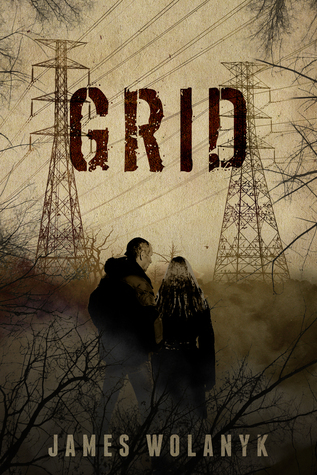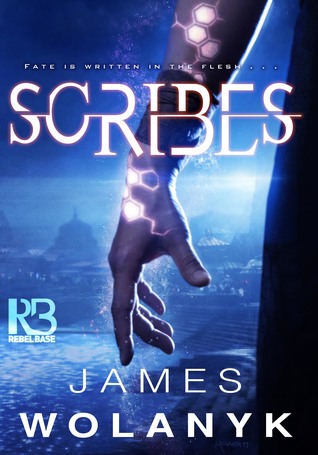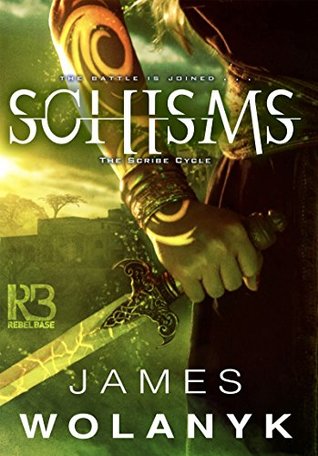Author Spotlight: James Wolanyk
James Wolanyk is the author of the Scribe Cycle and a teacher from Boston. He holds a B.A. in Creative Writing from the University of Massachusetts, where his writing has appeared in its quarterly publication and The Electric Pulp.
After studying fiction, he pursued educational work in the Czech Republic, Taiwan, and Latvia. Outside of writing, he enjoys history, philosophy, and theology. His post-apocalyptic novel, Grid, was released in 2015. He currently resides in Riga, Latvia as an English teacher.
Thanks for joining us today, James. Let’s start small: tell us about a great book you’ve read recently!
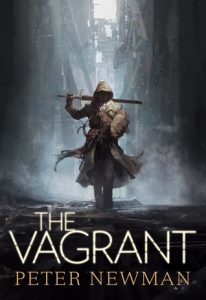 The Orchardist by Amanda Coplin broke my heart in all the right ways. It’s set around the turn of the century in the Pacific Northwest, and tells the story of a solitary man who chooses to take in a pair of girls fleeing from a brothel. Things go downhill from there. It’s one of those books that’s bound to wreck you for weeks, but still makes you come crawling back for more gut-punches because of the small glimmers of humanity here and there. I’m a glutton for that sort of pain in literature. If we’re sticking to fantasy, I think it would have to be The Vagrant by Peter Newman. The guy’s a genius.
The Orchardist by Amanda Coplin broke my heart in all the right ways. It’s set around the turn of the century in the Pacific Northwest, and tells the story of a solitary man who chooses to take in a pair of girls fleeing from a brothel. Things go downhill from there. It’s one of those books that’s bound to wreck you for weeks, but still makes you come crawling back for more gut-punches because of the small glimmers of humanity here and there. I’m a glutton for that sort of pain in literature. If we’re sticking to fantasy, I think it would have to be The Vagrant by Peter Newman. The guy’s a genius.
Okay, time to escalate things: reality warps and you suddenly find yourself leading a D&D-style party through a monster-infested dungeon. What character class are you, and what’s your weapon of choice?
Now we’re talking. I was a DM for a few years, so I think I’ve got a solid handle on how to avoid becoming a human shishkebab. My vote goes to the inquisitor—the high charisma rolls can turn foes into unexpected allies. Plus, you can torture kobolds into telling you where the hidden passages are. Not that I’d ever do that, of course. If I can’t bring a musket with me, I’m going with a studded mace for some skull-cracking action.
When you’re not trawling through dungeons, do you prefer to type or to hand-write? Why?
Typing has always been my method of choice. There’s a certain elegance in printed letters that makes your ideas come across as more serious, I suppose. I should also mention that my handwriting is atrocious. When I taught in Taiwan, the local teachers actually asked me to write on the boards as little as possible, since your handwriting is a reflection of your mind’s capabilities in a lot of traditional Chinese culture. They probably thought a trained ape was teaching the class. But aside from that, I’m swift with typing, can delete things on the fly, and don’t need to write things twice to have them in their final format. Finally, I have traumatic memories of my hands cramping while writing standardized test essays.
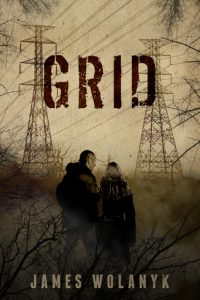 And how do you like to work – in silence, with music, or serenaded by the damned souls of a thousand dead shrimps?
And how do you like to work – in silence, with music, or serenaded by the damned souls of a thousand dead shrimps?
The shrimp thing is going to haunt my dreams now. Typically I like silence, though it’s in short supply in the modern world. A happy compromise is to listen to ambient music, such as Hammock or synthwave stuff, while I actively write. Anything with lyrics is going to distract me from creating words, and anything too energetic tends to make me dance instead of work. That being said, when I want to get inspired for writing a new scene, my playlist is an absolute unit. We’re talking Coheed and Cambria bumping shoulders with Lil Uzi Vert and Death Grips. It’s all over the place.
Are you an architect or a gardener? A plotter or a pantser? D’you write in your underwear, or in a deep-sea diver’s suit? Tell us something unusual about your writing method!
Shamelessly admitting that I had to look up architects and gardeners to respond here. I think all writing is a combination of these approaches, and my stuff is no exception. Usually I have a flash of a “great idea,” then start writing down a bunch of nonsense to create a worldbuilding frame for the idea. From there, a character usually springs up and asks for some screen time. I make a lightweight plot outline that hits the major story beats, but I seldom stick to the outline for the entire story. At some stage, hopefully, a character’s personality becomes obvious enough to start writing based on what that character would do. Sometimes things just seem too cool or natural to avoid throwing them in.
That being said, there’s also ample room for exploring a scene once you really start writing it. Half of the fun in writing is just finding these little trinkets and gems that present themselves during the process. You just get these genuine, explosive moments that result from the pieces all coming together with some flourish: emotional payoffs, plot twists, backstabbing.
In regards to attire, you’d be hard-pressed to find me wearing anything other than a t-shirt and boxer briefs while I write. Jeans are too constricting, and boxers are too loose. There’s a happy medium. Is that weird enough to qualify?
What are your most significant non-book fantasy influences?
Definitely films. Films have always been my second love, and I’m an obsessive cinephile that’s seen nearly everything you can think of (as long as Rotten Tomatoes has its score above 30% or so). Some of my favorite directors have definitely lent their cinematic style to my writing: Denis Villeneuve, Darren Aronofsky, Terrence Malick. Check out their stuff.
What was the last thing you watched on TV and why did you choose to watch it?
If we count Netflix as TV, it would be that new Sabrina show. Chilling Adventures of Sabrina, I think it’s called. What can I say? It’s spooky, witchy, gory. Three thumbs up.
 The world shifts, and you find yourself with an extra day on your hands during which you’re not allowed to write or otherwise do any work. How do you choose to spend the day?
The world shifts, and you find yourself with an extra day on your hands during which you’re not allowed to write or otherwise do any work. How do you choose to spend the day?
Half the day would probably be spent meditating. That’s something I do every day, without fail, no excuses. And to answer the inevitable question, yes, it’s boring. Beyond that, I’d love to eat some tasty food, take a walk in the woods, play some video games, and possibly win $10 million from a lottery ticket. I’m a simple man.
If you could choose one punctuation mark to be made illegal, which would it be and why?
Let’s be real—the em and en dashes need to settle their score right now. I’m sick and tired of this sibling rivalry. You’re confusing the world!
In no more than three sentences, tell us a little something about your current work in progress!
The new project was started literally three days ago, so this interview has good timing. It’s another fantasy series set in a universe that may or may not be linked to the Scribe Cycle. Here we go:
A young, arrogant monk’s temple (and his entire family) is slaughtered during a crusade’s purge of the Vikashan religion. He vows to reach enlightenment, acquire a set of otherworldly, brutal powers, and get sweet vengeance on the god-emperor who ordered the crusade.
If you could co-write or co-create a series (like The Expanse, or the Malazan Book of the Fallen), who would you choose to work with and why?
Josiah Bancroft, I think. Senlin Ascends is one of those books that comes out of left field and bowls you over with its worldbuilding. I’m in love with the way he builds his universes and gives them texture.
What’s the most (and/or least) helpful piece of writing advice you’ve ever received?
The most helpful came from my college mentor, Andre Dubus III. He left little notes on my drafts that said “go deeper.” Short and sweet. The closer we get to a character’s inner world, the more authentic it feels. The worst, ironically, is one that I hear from a lot of people nowadays: “write when you feel like it.” If you write this way, the chances of putting out a novel before you’re dust and bones is extremely low. Most people do not feel like writing. It’s tough. It’s icky. But it has to be done.
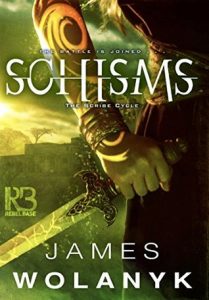 If you could visit any country at any point in history, where/when would you go, and why?
If you could visit any country at any point in history, where/when would you go, and why?
Hopefully I could just visit this place, seeing as there was no modern dentistry available, but it would be pretty great to visit India or Nepal when Buddhism and Hinduism were in full swing. There are a lot of legends about that period, but there are also records of people with mental clarity and wisdom that I can hardly fathom. I’ve always had a bit of a monkey mind, so my life’s work is to tame it.
Every writer encounters stumbling blocks, be it a difficult chapter, challenging subject matter or just starting a new project. How do you motivate yourself on days when you don’t want to write?
Frankly, I just write. Whatever comes out may be atrocious, but at least it’s an attempt to make something. And more often that not, some of the most difficult days produce at least a sentence or two that informs the next day of writing. They also lend some contrast to the days in which you feel spirited and encouraged to write.
Tell us about a book that’s excellent, but underappreciated or obscure.
Almost nobody I’ve spoken to has read The Forever War by Joe Haldeman. It’s an allegorical sci-fi novel about Vietnam, framed as an interstellar fight that relies on scientifically accurate faster-than-light tech. It presents some thought-provoking material in regards to conflict, time, war, and other heavy stuff.
Finally, would you be so kind as to dazzle us with what we like to call a ‘shark elevator pitch’? (It’s exactly the same as an elevator pitch, but with sharks.) (Well, one shark. Which, by the way, is currently picking between its rows of teeth to try and dislodge the remains of the last author who stepped onto its elevator.)
Ahem. So: why should readers check out your work? A shark elevator pitch of your own book(s) in no more than three sentences – go!
Simply put, the Scribe Cycle is my attempt to write literary, emotionally honest fantasy that emphasizes the human spirit above “cool stuff”—there are no tropes such as the badass assassin, the spunky sidekick, the wise master. It follows a rune-scarring young girl who’s forced to grow up in a vicious, impossibly wicked world and still keep her chin above water, often making mistakes and suffering for her integrity along the way. Oh, and there are sentient spiders, magnetic rifles, and scenes you’d expect to find in Zero Dark Thirty, if you’re into that.
Brilliant, James. Thanks again for joining us!
James Wolanyk is the author of GRID and the SCRIBE CYCLE.

